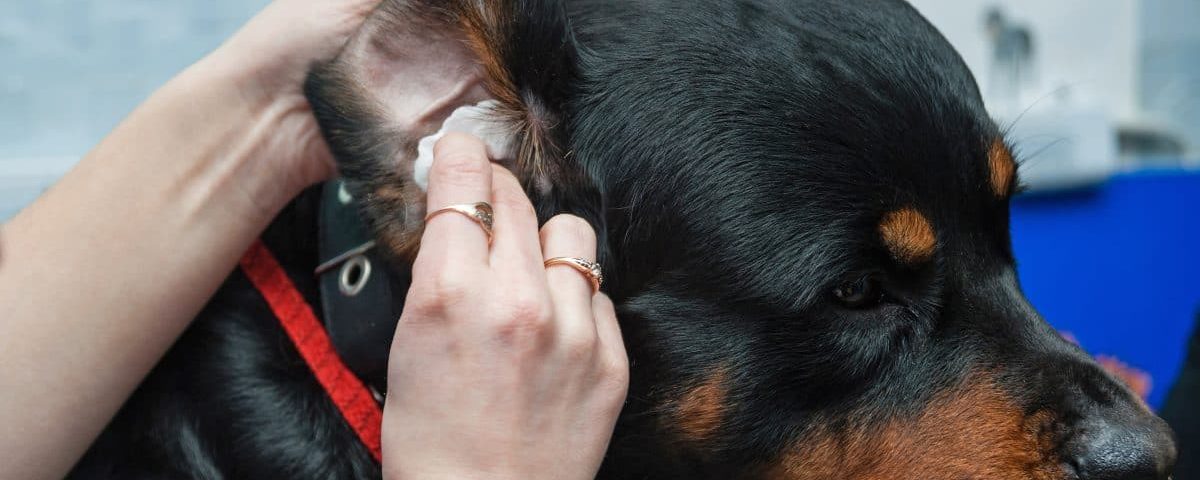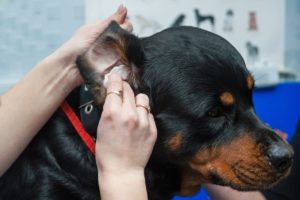
Why Dogs Need Meat
February 20, 2020
Dog Toys
February 20, 2020Dog Ear Infections

Ear infections in dogs are among the top three reasons that owners take their dogs to the vets. Often manifested as your canine companion constantly shaking their head or scratching their ears, it is unpleasant, uncomfortable and if untreated, or ignored, will just get worse.
How can we reduce or prevent ear infections in dogs and as owners, what can you do to treat and avoid them? We take a look at the different reasons that ear infections occur and how you can treat them naturally and reduce the risk of them re-occurring.
How to tell if your dog has an ear infection
If this is your first experience of a dog with an ear condition then you may be wondering what you should be looking out for. In fact, there are a number of tell-tale signs and symptoms that all is not well with your dog’s ears.
Regular shaking of their head
Some of you may be familiar with the action of your dog constantly shaking their heads, the way they do when they are trying to dry themselves off. If it is a one-off then there is no cause for concern. It is when they seem to be constantly, and rigorously, shaking their head as if trying to get rid of something, that all is not well.
Scratching their ears
Dogs do scratch their ears – that’s a natural thing – a bit like us scratching our back. It is when they are consistently scratching their ears over a sustained period of time that you need to take note that there may be an issue. This could indicate an ear infection or the beginning of one.
Discomfort and pain
If your dog has an ear infection they may whine or even yelp when you touch their ear. In severe cases, ear infections can lead to hearing loss, an issue with balance or walking in circles.
Redness and swelling inside the ear
Take a look inside the dog’s ear. Conditions such as ear mites are recognisable as they leave a red-brown or black like crust inside the outer-ear. You will also see redness and inflammation inside the ear if they have been regularly scratching.
A bad smell
A yeast infection is the most common reason that your dogs’ ears smell but be warned, if you are about to start smelling your dog’s ears – it can be quite unpleasant. Just like any
yeast infection, not only are they painful and uncomfortable they also emit a cheese like smell.
What causes ear infections and other conditions in dogs?
There are a number of causes of ear infections in dogs however, often these can be caused and exacerbated by a poor diet, which can compromise a dog’s immune system. You see, like humans, the immune system in dogs is a complex thing. Basically, if a dog is fed a low-quality diet, full of processed ingredients that are essentially alien to a dog’s gut, these ‘nasties’ can penetrate the mucous lining of the gut wall and ‘leak out’ into the bloodstream as toxins. These toxins cause inflammation in the body and can present in conditions such as ear infections. To protect the gut lining and prevent this condition known as ‘leaky gut syndrome’, feeding your dog a species appropriate natural raw dog food diet is the greatest protection you can offer.
Food Sensitivity
Wheat gluten is not supposed to be consumed by dogs and can cause a food sensitivity which manifests itself as itchy skin, paws or ears as discussed above. Changing their diet and cutting out wheat gluten can help a number of health conditions in your dog. Switching to raw should be the first step.
Ear Mites
Ear mites are quite common in many dogs, especially those with big flappy ears that offer a warm and cosy place for them to habit. While they can be picked up almost anywhere, dogs with a lower immunity can be more susceptible.
Bacterial
Once a dog has scratched their ears, bacteria can get in. Also, dogs who love to swim can pick up infections in their ears – big flappy ears are especially prevalent at keeping all that moisture in.
Yeast
Possibly the worst kind for all concerned because as well as discomfort and pain, they can also smell really bad. They can be caused by moisture in the air, wet paws, a bit of wet weather and swimming. Moisture becomes breeding ground for yeast. Again, feeding a natural, species appropriate BARF (Bones And Raw Feeding) diet has a positive role to play. Yeast feed on carbs so if your dog is on a high carbohydrate diet like kibble, you are giving the yeast more chance to develop and grow.
How to treat ear conditions in dogs
Before you rush off to the vets, who will in many cases prescribe antibiotics and present you with a bill, let’s take a look at more natural remedies and ways to treat ear infections in dogs.
- A biologically appropriate raw diet (BARF)
- Raw garlic crushed up with their raw food
- Almond, Sesame oil or garlic oil or apple cider vinegar to clean the ears
Clean the ears, wipe them first then soak a cotton wool ball in a solution, wipe the ear with that then clean again. Healthy ears shouldn’t need regular cleaning so be careful not to over clean or you could cause issues yourself. Just pay attention to them after swimming and check them regularly.
How to avoid future issues
We have already mentioned how many conditions start in the gut and how, a condition known as leaky gut can be responsible for many of the food allergies, sensitivities and other conditions that your dog may suffer with. In order to protect your dog, feeding them the right diet is critical. To protect the digestive system and gut, you need to increase the ‘gut flora’. Now gut flora is the good bacteria that live in the digestive tract of both humans and animals. The wrong diet can upset the balance of this bacteria, leading to leaky gut and bad gut health. By feeding the right diet you will increase the gut flora, therefore improving the immune system.
Dogs anatomies are designed to eat a raw diet
If your dog is kibble fed, it is time to consider making the switch to raw. Dog’s anatomies are designed to eat and digest raw food. Not the processed and highly manufactured pet foods sold by the big companies and sold to us as the ideal solution for your dog. A raw diet will improve the gut flora in the digestive tract, improving your dog’s immunity, reducing their sensitivities and ear ailments and benefiting their overall health.
Introduce a probiotic to your dog’s diet
In addition to switching to a raw diet, a probiotic will improve the gut flora in your dog. Probiotics from Animotics is an excellent example which provides multiple strains of bacteria. With 22 billion colony forming units for dogs, this high strength formula is the UK’s first true canine probiotic.
General care of the ears
As well as changing their diet and introducing a probiotic, general care of the ears is paramount. If your dog likes to swim, dry their ears after swimming. Use cotton wool to give the insides a quick clean. Keep the ears groomed to prevent matting and clean them regularly with the methods mentioned above.



